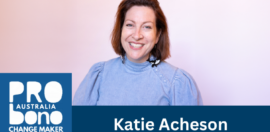From Politics to Not for Profit
25 February 2014 at 8:53 am
From her earliest school days Anna Bligh had a burning desire to make a difference. Now, after a distinguished political career, the former Queensland Premier writes for Pro Bono Australia about her recent transition from politics into the Not for Profit sector.
Making the move from the corporate world to the Not for Profit world is a move that's becoming more common.

People who have had long, successful careers in a range of disciplines are increasingly transferring their skills to charitable organisations, meshing management and boardroom experience with the expertise of those in the community sector, resulting in an ever increasing commonality of language and shared outcomes.
Making the move from politics into Not for Profit is something that's not unheard of either, particularly at Board level. However, when I chose to accept the hands on role as CEO of YWCA NSW, there were many who seemed surprised.
Perhaps they were surprised because, on the face of it, it seems so different? Perhaps, after the whirlwind of 17 years in 24/7 public life and a challenging year health wise, people were surprised I'd taken on such an involved role?
The truth is that there is no clear or usual path out of politics, especially after a high profile career at a leadership level.
There's a widely held view that politics is so entrenched in the DNA of those of us who practice it that we never really want to leave it and are always looking for new ways to get back into it. This is undoubtedly true for some, but for me, like most former Government leaders I suspect, I was ready for a new and different challenge.
At first glance, the NFP sector and the world of politics may seem very different. But they both require a lot of passion for the work, a strong set of values and a belief in positive change. Both, when practiced well, seek to make the world a better place. And as any leader will tell you, no matter what you're leading, or the size of your team, you're faced with the same demands, the same responsibility to anticipate challenges, to see over the horizon and to chart new directions.
I’ve always had a passion for the work that’s done in the NFP sector. I started my working life as a child support officer in a refuge for women escaping domestic violence and went on to work in family support services in both New Zealand and Sydney during the 1980s.
It was my work in a number of NGO Social Services, primarily involving women and children, that informed many of my social reforms and programs as a Minister and as Premier of Queensland, including the implementation of Queensland’s first stand-alone Disability Services agency, the first complete overhaul of Queensland's Child Protection legislation in more than 40 years, and the introduction of significant new legal protections for those experiencing domestic violence, including in same sex relationships, and carer and elder abuse.
So for me, returning to the NFP sector is a full circle move. It seems the best place to bring the skills, knowledge and experience I developed in public life and put them all to worthwhile use. YWCA NSW, with its emphasis on services and programs for women, children, young people and their families aligns with the passions that have motivated me throughout my life.
Of the many reactions I received to my decision to join YWCA NSW, one of the most interesting was from a friend who has spent her life working in public policy, in both academia and government. During my first week in the job, she fired off a note congratulating me on the new job and for "joining the third sector – the employment sector of choice for the best and brightest in the twenty first century".
Putting aside the hyperbole that one is lucky to receive from friends, she makes an interesting point. For most of her working life, those who wanted to make an impact on public policy and shape the world around them often sought employment in government, either in the political or bureaucratic sphere, or in our universities.
In the last half century, governments of all political persuasions have increasingly turned to the NFP sector to provide services which have been provided by government for centuries. We have seen it happen in social housing and employment services. We've seen major shifts out of large scale institutions in disability, mental health and the care of children.
While there's no doubt that concerns about costs have driven some of this shift, it's equally true that a genuine concern about the quality of these large, impersonal monolithic models has also motivated the changes.
As these changes have unfolded, they have required serious intellectual effort, innovative program design, the development of whole new models of care and service delivery and strong leadership. This, in turn, has built substantial capability in the NFP sector.
In the few short weeks since I joined YWCA NSW, it’s obvious to me that the NFP sector I’ve re-joined is not the NFP sector I left some 25 years ago. I’m struck by the size and capacity of the sector, by the scale and depth of the services it’s providing, by the professionalism that characterises its work, by the commercial expertise that underpins much of its operations and the strong measurement and accountability frameworks that it rests on.
I see all of this at YWCA NSW every day and I see it in the organisations we work with to make a difference.
I’m also struck by the increasingly sophisticated relationship between corporate Australia and the NFP sector. Strong and meaningful partnerships, based on genuinely shared goals are increasingly commonplace. These relationships are robust, they’re long term and they bring something valuable to all parties. In Government, I watched these partnerships develop from afar and it’s gratifying to see their strength up close and first hand.
It’s very early days in the transition for this former politician, but my friend was right, this is an exciting, stimulating, effective sector, making powerful inroads into poverty and disadvantage.
It does indeed feel like the place to be in the twenty first century.
About the author: Bligh joined YWCA NSW as CEO in January 2014 after a long career in politics. She was elected to the Parliament of Queensland in 1995, became the first female Premier of the State in 2007, and Australia’s first popularly elected female Premier when she won the 2009 Queensland State election in her own right.
Her first job after completing an Arts degree in Social Sciences was as a child support officer in a women's refuge. She then went on to work as a community worker in a neighbourhood centre and to establish a new family support service.
After retiring from politics in 2012, Anna moved to Sydney with her family. She was drawn to YWCA NSW by its energetic drive to make a difference, strong values, strength of mission and purpose and its innovative structure and funding base.







